Edson Arantes Di Nascimento "Pelé"
Edson Arantes Di Nascimento is undoubtedly the best player in the history of the 20th century and for many the best player
Games
Goals
Assists
Trophies
Officials games:
1952/56 Bauru AC (BRE) (Youth)
1956/74 Santos FC (BRE) 659 matches, 653 goals
(Brazilian Championship: 83 matches, 34 goals)
(Taça Brasil: 30 matches, 30 goals)
(Torneio Roberto Gomes Pedrosa: 57 matches, 37 goals)
(São Paulo Championship: 410 matches, 467 goals)
(Rio-São Paulo Tournament: 53 matches, 49 goals)
(Copa Libertadores: 15 matches, 16 goals)
(Intercontinental Cup: 3 matches, 7 goals)
(Intercontinental Champions Super Cup: 7 matches, 3 goals)
(Recopa Sudamericana: 1 match)
1975/1977 Cosmos New York (USA) 64 matches, 37 goals
(NASL: 56 matches, 31 goals)
(Play-offs: 8 matches, 6 goals)
Unofficial games:
1956/74 Santos FC (BRE) 456 matches, 446 goals
1957 Santos/Vasco combined team 4 matches, 6 goals
1961/62 São Paulo Athletics Union 2 matches, 3 goals
1975/1977 Cosmos New York (USA) 41 matches, 26 goals
1976 American All-star Team 2 matches
1977/90 Charity match 8 matches, 5 goals
1978 Fluminense (BRE) 2 matches
1979 Flamengo (BRE) 1 match
With the National Team :
Official matches:
92 caps, 77 goals
(Friendly matches: 51 caps, 37 goals)
(World Cup qualifiers: 6 caps, 6 goals)
(World Cup: 14 caps, 12 goals)
(Copa America: 6 caps, 8 goals)
(Copa Roca: 4 caps, 5 goals)
(Copa Bernardo O'Higgins: 2 caps, 3 goals)
(Copa Oswaldo Cruz: 4 caps, 5 goals)
(Copa del Atlántico: 2 caps, 1 goal)
1st cap: 7 July 1957 against Argentina (1-2)
Last cap: 18 July 1971 against Yugoslavia (2-2)
military: 3 caps, 1 but
São Paulo selection: 13 selections, 9 goals
Unofficial matches:
20 selections, 18 goals
military: 8 selections, 13 goals
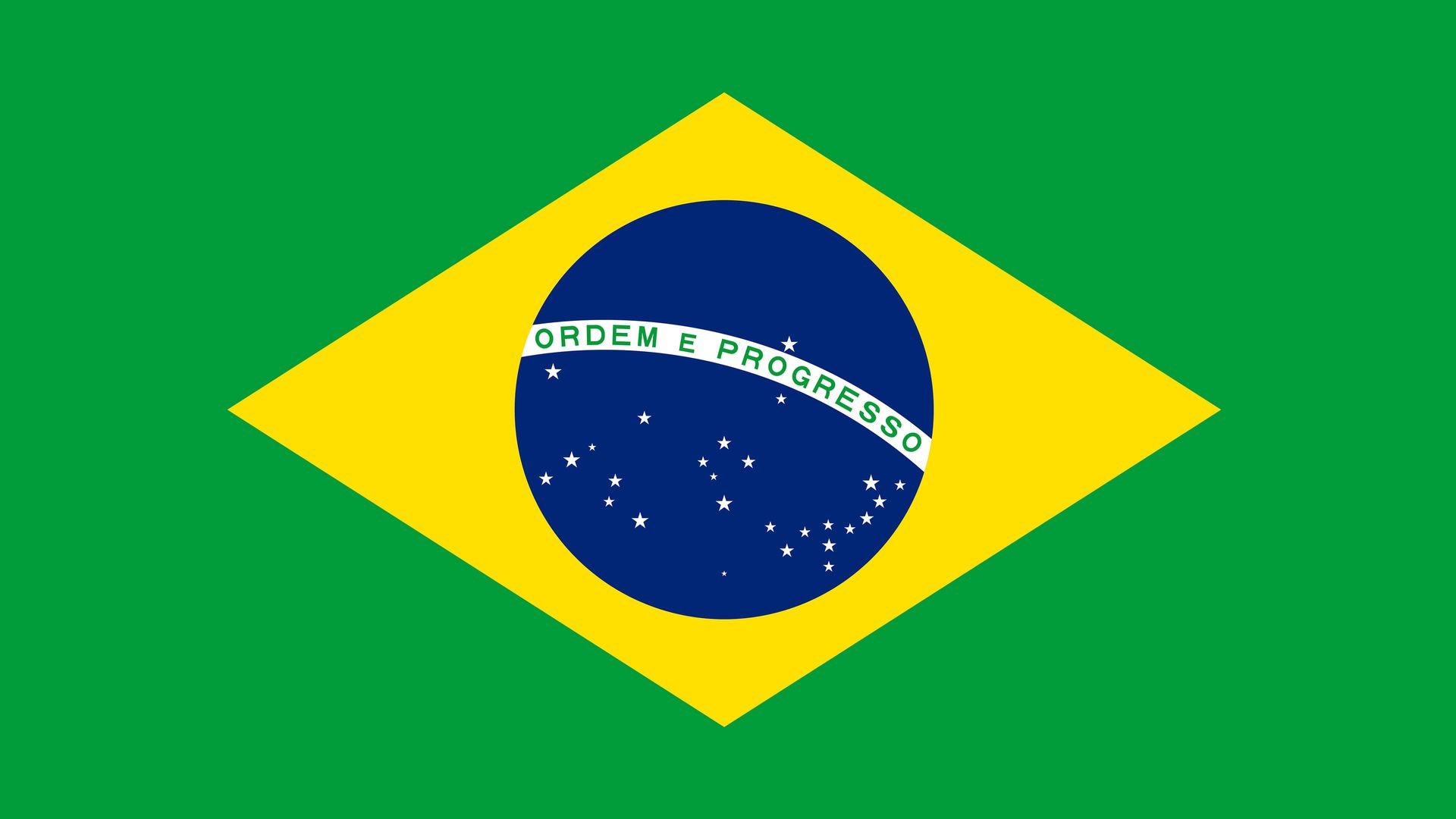
Edson Arantes Di Nascimento
Born October 23, 1940 in Três Coraçoes (BRE)
Died December 29, 2022 in São Paulo (BRE)
Brazilian, striker, second striker, false 9, attacking-midfielder, 172 cm
Nicknames: "O Rey" ("The King")
Son of a very good football player
Edson Arantes Di Nascimento was born in the city of Três Coraçoes, which means "Three Hearts" in Brazil. Son of João Ramos do Nascimento, known as "Dondinho", he was raised in a poor family. First nicknamed "Dico", then "Belé" and finally "Pelé", he played in the youth teams of Bauru AC.
He was then spotted by Waldemar de Brito, a former international player who had been part of the Brazilian national team during the 1930s. He would come to change the destiny of the young shoe shiner who wanted to become a professional footballer. His mother, traumatized by her husband's injury and the precarious situation they were living in, did not want to see him become a footballer. But seeing the talent and determination of the young Brazilian, she agreed for him to go to Santos.
The perfect athlete
He arrived in Santos when he was only 15 years old and began training with the team's professional players. His first match would take place against Corinthians on September 7, 1956, at the age of 15. First match and first goal! In a very short time, he became a phenomenon in Brazil and the coach at the time, Sylvio Pirillo, decided to join the 16-year-old player on the Brazilian national team who is coming off World Cup failures and a loss of popularity among Brazilians.
He began his international career on July 7, 1957 against Argentina at the fabulous Maracana stadium, in front of 200,000 spectators. First match and first goal! Again! Pelé was already one of the best players in the world. With phenomenal technique, he was a very agile player with great balance. Gifted with both feet, he was also an excellent sprinter, despite his 1.72 meters, he was able to run 100 meters in 11 seconds.
Let's continue with his qualities, he was a player with impressive vertical jump, among the best football players and athletes of all time in this field. He also had great composure that he developed over the years. Capable of making short and simple dribbles, he was also a great fantasist, capable of inventing new technical moves, each more effective than the last. He was also one of the best finishers and scorers in history, not to mention his passing skills, and sometimes defensive ones!
A dream professional debut
He finished 1957 with a mind-blowing total of 43 goals and 19 assists in 40 matches, at only 17 years old! Crazy statistics! He was therefore logically selected in the Brazilian team for the 1958 World Cup. Unfortunately, he was injured shortly before the start of the competition, but the coach could no longer make any changes and so he made the trip.
He missed Brazil's first two matches in Sweden. The coach, Vicente Feola, offered him his first selection in the World Cup during the match against the USSR. Pelé will not score but will deliver a superb assist for Vavá, a 2-0 victory for Brazil which goes to the quarter-finals.
In the quarter-final against Wales, he is the hero of his country by scoring the only goal of the match, he then becomes the youngest scorer in the history of the World Cup at 17 years and 239 days. He also silences the criticism of European journalists on the "Joga Bonito", football considered too "primitive" by journalists of the time. However, this football that Pelé will popularize throughout the world is the DNA of the football that will win 3 World Cups between 1958 and 1970.
In the semi-final, Pelé will once again establish himself as one of the best players in the world by scoring a hat-trick against France and allowing his country to go to the World Cup final. In the legendary 4-2-4, Pelé plays as a centre forward who doesn't hesitate to drop into midfield and bring the ball up with his speed and dribbling.
During the final, initially led by Sweden, the Brazilians will definitively silence the critics by pulverising the host country, Sweden, by a score of 5 goals to 2, with a double from Pelé, who at 17, becomes the youngest winner in the history of the World Cup and the youngest to score in the final. Pelé then becomes The King Pelé.
Pelé was no longer the little prodigy who was supposed to confirm, but he had become in the space of a few months, the best player in the world. A proud representative of Brazilian football, he fascinated by the simplicity with which he performed difficult gestures. A prolific scorer, a masterful playmaker, an exceptional passer, and a genius of the round ball, the one who is now nicknamed "O Rei" will become the best player of all time.
Pelé ended the year 1958, at 18 years old, as one of his most prolific, in 53 matches, he scored 75 goals and provided 18 assists. Pelé was then without a doubt, the best player in the world. Pelé was also very popular for his political and humanitarian actions. He notably collaborated with UNESCO to help children in difficulty.
A player with impressive statistics who will never have been able to play for a European club
Pelé's statistics are just crazy, if we count the "unofficial" matches which are mostly prestige matches against the big European clubs who wanted to face Pelé's Great Santos, he peaks at 1284 goals in 1375 matches! He notably scored his 1000th goal at the Maracanã, on his mother's birthday. The crowd was so delirious with the feat that the match had to be interrupted after Pelé's penalty. The match would not resume until 30 minutes later.
During his career, he scored 92 hat-tricks, 30 quadruplets, 6 quintuplets, and once an octuplet against Botafogo in 1964. Pelé's club career was so influential that his club did not hesitate to take advantage of it to tour Europe many times against the best European clubs.
And there, where one could imagine that Pelé would join Europe and a big club to continue his career, he had no choice, in a country governed and controlled by military power, the player is declared "Brazilian National Treasure" and therefore cannot leave the country without the government's agreement.
A global football superstar
Pelé will have known how to enter the best by his high-class gestures on the field, capable of attempting a lob on the Bulgarian goalkeeper Georgi Naydenov from the center circle or of succeeding in a body feint followed by a great bridge on the Uruguayan Ladislao Mazurkiewicz. There is no doubt that Pelé is one of the players if not THE most influential player in the history of this sport.
In 1962 and 1963, Pelé will win the most prestigious club trophy on the South American continent twice: the Copa Libertadores. Pelé is so influential that his goals are remembered and engraved in bronze: on March 5, 1961, during the Santos-Fluminense match at the Maracana. He scored the famous "Gol de Placa", a goal worthy of a commemorative plaque. There is also a bronze plaque at the entrance to the stadium that tells the story of this goal in a few words. He dribbled seven players over 40 meters and at lightning speed scored with a low cross shot. A legendary goal scored in front of no less than 150,000 spectators and journalists. A notable fact of his life, his influence stopped a civil war in Nigeria by his presence alone in Lagos in 1970.
The greatest player of the Brazilian national team
In addition to a more than rich club career, the Brazilian player had one of, if not the most beautiful international career of all time: still to this day the only player in history to have won 3 World Cups.
With the Seleção, he participated in the 1962 World Cup, but he was injured and ended his tournament prematurely despite Brazil's victory for the second time in 4 years. In 1966, he was again in the Seleção squad but was once again injured by tackles from the Portuguese João Morais and the Bulgarian Dobromir Zhechev. The latter would even say: "I started the job. Morais finished it."
At a time when Pelé reigned over football, violent tackles from defenders were their only chance of stopping him, and many tried. Yellow cards were only introduced in football from the 1970 World Cup, so defenders did not hesitate to try to injure the Brazilian player.
Then came the 1970 World Cup, the most beautiful World Cup for many, and having surely seen the most beautiful international team of all time: Brazil 1970. With players such as Jairzinho, Rivelino, Tostao, Gérson, Carlos Alberto around Pelé, we could only hope for a new title for the King. This was the case, Brazil won 4-1 in the final against Italy, Pelé scored 4 goals during this edition, and ended up involved in 14 of the 15 other goals scored by Brazil, with a total of 28 chances created!
It was at the end of this World Cup in Mexico that Pelé decided to retire from international football, tired by the many matches, but above all angry with the Brazilian federation. A choice that no one understands. He played his last match for the national team against Yugoslavia on 18 July 1971 at the Maracana. More than 140,000 people came to see King Pelé play for the last time in the Seleção jersey, who asked their idol to stay with chants of "Fica! Fica!" ("Stay! Stay!"), in vain. "You have to leave when the public wants you to stay, not when they want you to go," he wrote. He did not play in the World Cup in 1974, despite being physically credible at 34. In all, he scored 77 goals in 92 matches in the yellow jersey.
End of career for the greatest legend of this sport
In 1974, when he was 34 years old, the Brazilian football legend who had just finished a season with 36 games, 16 goals and 9 assists, decided to end his career. An exceptional career in Brazil, almost unmatched given the impact and the immense trophy cabinet. If we have to pick out 3 other exceptional years of the player, those of 1964 (38 games, 54 goals, 24 assists) come straight to mind; 1962 (40 games, 54 goals, 31 assists); 1965 (53 games, 73 goals, 31 assists) and especially his best, 1961 (38 games, 62 goals, 33 assists).
While we thought his career was over, he finally came back to play, because he was in debt. He therefore signed in the US league with the New York Cosmos for a contract estimated at 4.75 million dollars over 3 years, a crazy sum for the time).
With Pelé, football or called "soccer" in the USA became popular in total, he scored 37 goals in 64 official matches for the American club. Worn out by injuries, he was still physically forced to end his career in 1977. He ended his career at Giants Stadium during a match against Santos FC on October 1, 1977 in front of 75,000 spectators. Unable to hold back his tears at the end of the match, the Brazilian star was carried in triumph by his teammates, for a final lap of honor at the height of emotion. Simply exceptional. The final word goes to the Brazilian poet Carlos Drummond de Andrade: "The difficulty, the extraordinary side, is not to score 1000 goals like Pelé, it is to score one goal like Pelé."
Trophies :
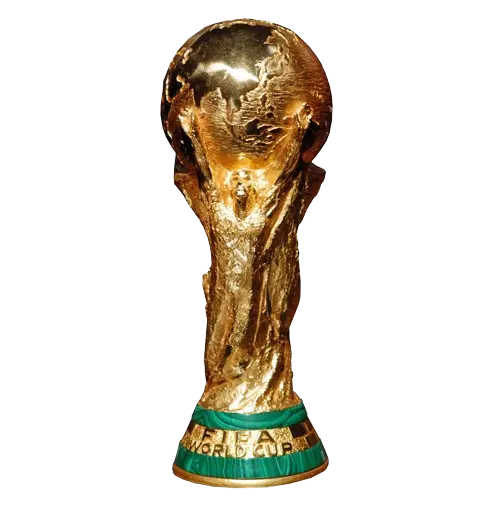
World Cup x3
- 1958 (Brazil)
- 1962 (Brazil)
- 1970 (Brazil)
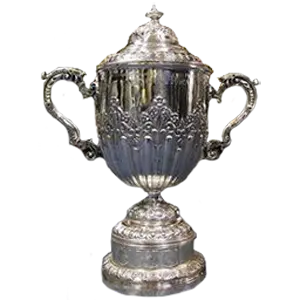
Copa Roca x2
- 1957 (Brazil)
- 1963 (Brazil)
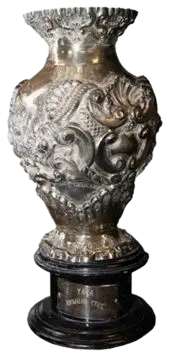
Copa Oswaldo Cruz x3
- 1958 (Brazil)
- 1962 (Brazil)
- 1968 (Brazil)
Copa del Atlántico x1
- 1960 (Brazil)
Copa Bernardo O'Higgins x1
- 1959 (Brazil)
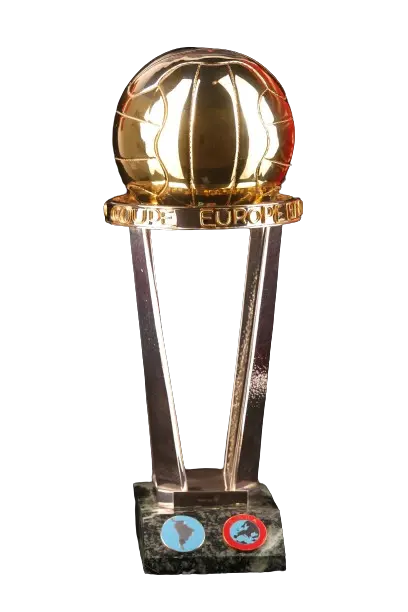
Intercontinental Cup x2
- 1962 (Santos FC)
- 1963 (Santos FC)
Intercontinental Champions Super Cup x1
- 1968 (Santos FC)
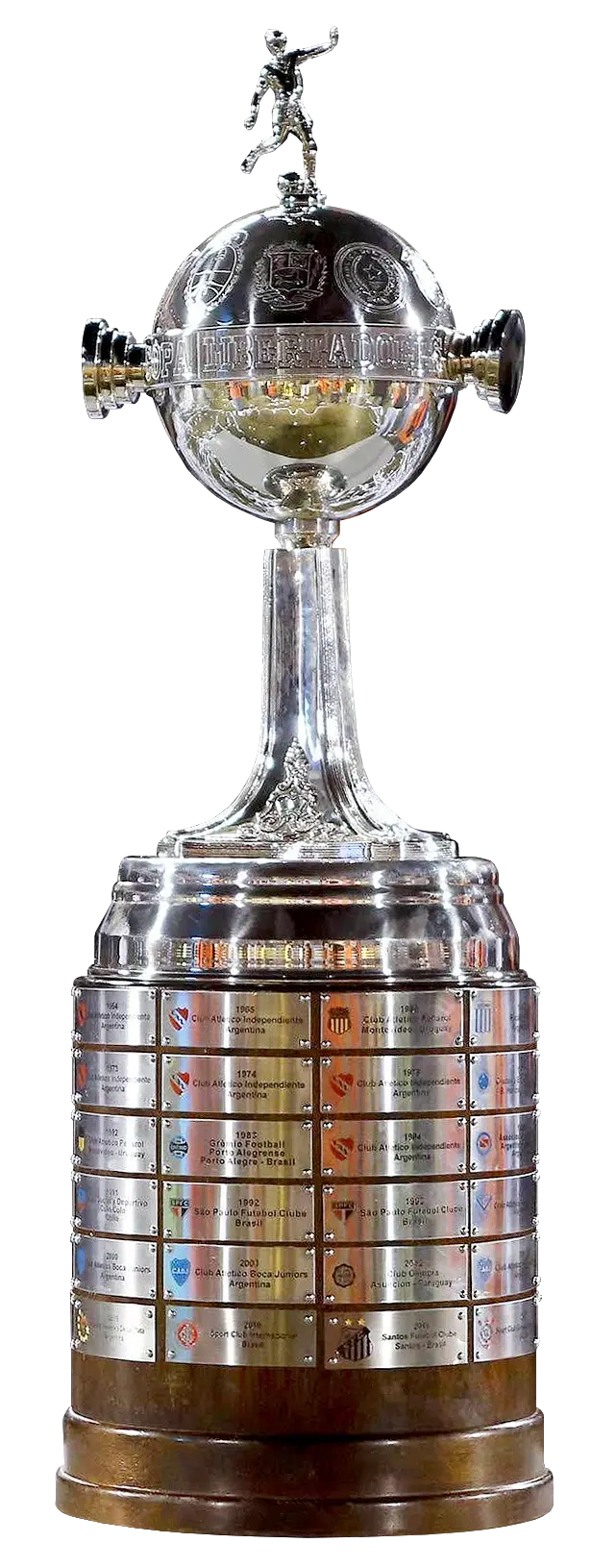
Copa Libertadores x2
- 1962 (Santos FC)
- 1963 (Santos FC)
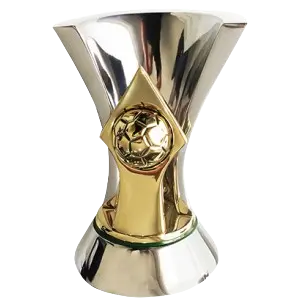
Brazilian League x6
- 1961 (Santos FC)
- 1962 (Santos FC)
- 1963 (Santos FC)
- 1964 (Santos FC)
- 1965 (Santos FC)
- 1968 (Santos FC)

Vice-Champion Brazilian League x2
- 1959 (Santos FC)
- 1966 (Santos FC)
NASL League x1
- 1977 (NY Cosmos)
São Paulo Championship x11
- 1956 (Santos FC)
- 1958 (Santos FC)
- 1960 (Santos FC)
- 1961 (Santos FC)
- 1962 (Santos FC)
- 1964 (Santos FC)
- 1965 (Santos FC)
- 1967 (Santos FC)
- 1968 (Santos FC)
- 1969 (Santos FC)
- 1973 (Santos FC)
Rio-Sao Paulo Tournament x4
- 1959 (Santos FC)
- 1963 (Santos FC)
- 1964 (Santos FC)
- 1966 (Santos FC)
Vice-Champion São Paulo Championship x2
- 1957 (Santos FC)
- 1959 (Santos FC)
Individual Trophies :
- Voted best world player of the 20th century in 1999
- Voted best South American player of the 20th century in 1999
- Voted best player of the 20th century by France Football in 2011
- Voted best FIFA player of the 20th century in 2000
- 2nd best scorer of the World Cup in 1958 (6 goals)
- Top scorer of the Copa America in 1959 (9 goals)
- Top scorer of the Copa Roca in 1957 (2 goals) and 1963 (3 goals)
- Top scorer of the Copa Libertadores in 1965 (8 goals) (Santos FC)
- 11 times top scorer of the São Paulo championship in 1957 (17 goals), 1958 (58 goals), 1959 (45 goals), 1960 (33 goals), 1961 (47 goals), 1962 (37 goals), 1963 (22 goals), 1964 (34 goals), 1965 (49 goals), 1969 (26 goals) and 1973 (11 goals) (Santos FC)
- Top scorer of the Taça Brasil in 1961 (9 goals) and 1964 (7 goals) (Santos FC)
- Top scorer of the Rio-São Paulo tournament in 1963 (14 goals) (Santos FC)
- Voted best South American player of the year in 1973
- 2nd best South American player of the year in 1972
- Voted best player of the World Cup in 1970
- Voted 2nd best player of the World Cup World in 1958
- Voted best young player of the 1958 World Cup
- Voted best player of the Copa America in 1959
- NASL MVP of the year in 1976
- Voted CONCACAF player of the year in 1976
- Received the Ballon d’Or d’honneur in 2013
- Voted among the “legends” of football by Golden Foot in 2012
- Voted best player of the 20th century by the English magazine “World Soccer”
- Voted best player in the history of the South American continent by the magazine “L’Equipe” in 2015
- Received the FIFA Order of Merit in 1984
- Received the FIFA Centenary Award in 2004
- Named to the World Team of the 20th Century
- Named to the typical team South American of the 20th Century
- Named to the Copa America All-Time Team
- Named to the FIFA World Cup All-Time Team in 1994
- Named to the FIFA Dream Team of the World Cup in 2002
- Named to the South American Dream Team 1958-2008
- Named to the All-Time Best XI by the English magazine "World Soccer" in 2013
- Named to the All-Time Team of the World Cup Tournament in 1958 and 1970
- Named to the World Team of the Year in 1960, 1961, 1962, 1963, 1964, 1965 and 1966 by the English magazine "World Soccer"
- Inducted into the American National Soccer Hall of Fame in 1993
- Inducted into the Brazilian Football Hall of Fame in 2010
- Voted Athlete of the Century by the International Olympic Committee (IOC) in 1999
- Voted Athlete of the Century by the Reuters news agency in 1999
- Voted Athlete of the Century by the world journalists of L'Equipe in 1981
- Voted International Sportsman of the Year by BBC Sport in 1970
- Received the Lifetime Achievement Award by BBC Sports in 2005 for his professional career
- Received the Laureus World Sports Awards for his entire career in 2000
- Appointed Commander of the Order of the British Empire in 1997
- Included in the 100 most important people of the 20th century by "Time" magazine in 1999
- Received an honorary degree from the University of Edinburgh in 2011 for his sporting achievements and his contribution to humanitarian causes
- Minister of Sports of Brazil from 1994 to 1999
- Grand Prize of the Academy of Sports in 1970
- International Peace Prize
- Named Knight of the Legion of Honor in 1963
- Named Knight of the Order of Rio Branco in 1967 and Commander in 1969
- Received the Order of Merit of the Hungarian Republic in 1994
- Ambassador for the UN and UNESCO for Education, Ecology and the Environment